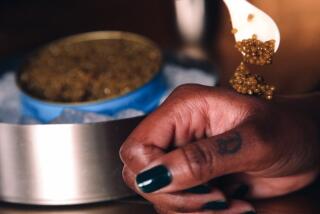The ‘black gold’ of the sea
In the case of Acipenseriformes, the ancient order of which sturgeon and paddlefish are the sole survivors, the chicken definitely came before the egg.
The meat of this giant of the deep, a candidate for the Loch Ness monster whose fossil record stretches back more than 200 million years, was apparently prized by the early Greeks and Romans. Smoked or fresh, the firm, sweet flesh remained such a valued delicacy that consumption was generally reserved to the upper class -- literally so in the 14th century, when King Edward II laid claim by royal edict to all sturgeon caught in English waters.
The behemoth’s eggs, however, were regrettably dismissed as fodder for poor folk, pigs and cats or simply tossed. But in the 1600s, just as Western European sturgeons had been so fished out that their meat had largely disappeared from collective culinary memory, the roe of the Caspian sturgeon began to develop as “a minor item of trade” with Mongols of the Caspian and Baltic regions. The Russian aristocracy quickly developed a keen taste for fresh, lightly salted caviar. But not everyone was instantly converted: Young Louis XV, after accepting a gift of caviar from Czar Peter the Great, “spat it out on the carpet of Versailles, offending the Russian ambassador.” Not until long after the Napoleonic wars, when well-heeled Russians fanned out through Western European capitals, bringing with them their beloved snack, kept fresh because of the speed of railways and manufactured ice, did the mystique of caviar begin to take hold.
Richard Adams Carey, a naturalist and author whose book “The Philosopher Fish” touches on just about every thinkable aspect of sturgeondom, didn’t start out as a fan of caviar, either. In the prologue, he tells an oddly tangential but unabashedly lyrical story of a crush he gladly suffered as an undergrad at Harvard. “Her skin was the color of oatmeal and milk freckled with chaff....[Her hair] was at once brutally thick and luxuriously fine, a twining of tree roots and silk.... She was hard to figure out and impossible to desire.” This passionate reminiscence culminates in the elusive damsel’s casual offer of a finger scoop of “something that looked like jam but smelled like fish,” an experience Carey shied from -- much as, we are to understand, he did from the girl.
Is “The Philosopher Fish,” then, an act of atonement for the sin excoriated by Zorba the Greek -- the sin of holding back, refusing a beckoning to pleasure, to passion, to the dance of life? The theme runs like an undercurrent throughout the book, in frequent references to “The Great Gatsby,” that paean to luxe and excess, and in such quotes as Simone de Beauvoir’s that desire “creates the desirable” or environmentalist Aldo Leopold’s “And how we rue our haste, finding the gilded morsel to contain a hook.”
Carey culls information from the messy front lines of the environmental wars. With the possible exception of a few lesser-known varieties, wild sturgeons are either extinct or nearly so. Mining and oil industries worldwide have ruined their spawning grounds. The few living exemplars of the famous Caspian Sea beluga (which produces “the most subtle” caviar), sevruga and osetra were probably conceived in hatcheries in such places as Azerbaijan and Iran. Even these sites, often ill-funded by their governments, are threatened with extinction.
Although most sturgeon species have been placed under protection, thanks to the U.S. Fish and Wildlife Service, the U.S. Endangered Species Act and the Convention on International Trade in Endangered Species of Wild Fauna and Flora, their conservationist defenders are often at loggerheads on strategy -- some forbidding artificial propagation, for example. Meanwhile, as the price of “black gold” caviar soars, poachers and smugglers are hunting down the very last fish.
Here’s the harvest: “The beluga ... lay on its flank on a factory floor, its trunk open from throat to anus. A man in oilskins pulled on the upper flap, revealing a gut that held a pool of blood and 200 pounds of glistening roe.”
Good to the very last bite? Bon appetit, dear comrades.

